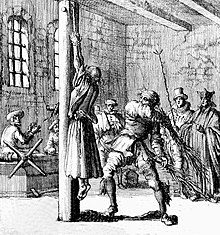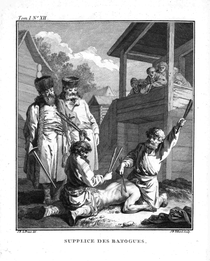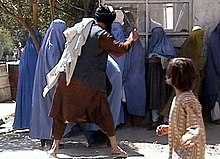Corporal punishment
Some states gained a reputation for their cruel use of such punishments; Sparta, in particular, used them as part of a disciplinary regime which was designed to increase willpower and physical strength.[13] By that boys should suffer corporal punishment, though it is received by custom, and Chrysippus makes no objection to it, I by no means approve; first, because it is a disgrace, and a punishment fit for slaves, and in reality (as will be evident if you imagine the age change) an affront; secondly, because, if a boy's disposition be so abject as not to be amended by reproof, he will be hardened, like the worst of slaves, even to stripes; and lastly, because, if one who regularly exacts his tasks be with him, there will not be the need of any chastisement (Quintilian, Institutes of Oratory, 1856 edition, I, III).Locke's work was highly influential, and may have helped influence Polish legislators to ban corporal punishment from Poland's schools in 1783, the first country in the world to do so.[19] Events such as these mobilised public opinion and, by the late nineteenth century, the extent of corporal punishment's use in state schools was unpopular with many parents in England.[20] Authorities in Britain and some other countries introduced more detailed rules for the infliction of corporal punishment in government institutions such as schools, prisons and reformatories.By the First World War, parents' complaints about disciplinary excesses in England had died down, and corporal punishment was established as an expected form of school discipline.[21] In the UK, the traditional right of a husband to inflict moderate corporal punishment on his wife in order to keep her "within the bounds of duty" was similarly removed in 1891.In the United Kingdom, the use of judicial corporal punishment declined during the first half of the twentieth century and it was abolished altogether in the Criminal Justice Act, 1948 (zi & z2 GEo.The notion of children's rights in the Western world developed in the 20th century, but the issue of corporal punishment was not addressed generally before mid-century.[43][2] In some other countries, corporal punishment is legal, but restricted (e.g. blows to the head are outlawed, implements may not be used, only children within a certain age range may be spanked).In addition, in Scotland, since October 2003, it has been illegal to use any implements or to strike the head when disciplining a child, and it is also prohibited to use corporal punishment towards children under the age of 3 years.However, the UK government stated there were no plans to change the law on smacking in England and said it would observe the impact of legal amendments in Scotland and Wales.[50] Around 33 countries in the world still retain judicial corporal punishment, including a number of former British territories such as Botswana, Malaysia, Singapore and Tanzania.[51] A number of other countries with an Islamic legal system, such as Saudi Arabia, UAE, Qatar, Iran, Brunei, Sudan, and some northern states in Nigeria, employ judicial whipping for a range of offences.[52] As of 2009[update], some regions of Pakistan are experiencing a breakdown of law and government, leading to a reintroduction of corporal punishment by ad hoc Islamicist courts.[65] Corporal punishment is associated with physical injury and abuse, it erodes parent-child relationships, reduces cognitive abilities and IQ scores, leads to mental health problems including depression and anxiety, and it increases adult aggression and anti-social behaviors.[67] One famous "Beating the Bounds" took place around the boundary of St Giles and the area where Tottenham Court Road now stands in central London.







Prohibited altogether
Prohibited in schools
Not prohibited in schools nor in a home, but prohibited in at least one setting
Not prohibited at any setting
Depends on state (USA)

Countries with judicial corporal punishment


Capital punishmentCorporal punishment (disambiguation)DomesticJudicialSchoolAmputationBeltingBirching BrandingCaningCat o' nine tailsFlagellationFoot whippingPaddleScourgeSjambokSlipperingSpankingStrappingSwitchRiding cropAfghanistanBruneiMalaysiaSingaporeTaiwanUnited Arab EmiratesUnited StatesCFCYL v. CanadaIngraham v. WrightS v WilliamsTyrer v. the United KingdomCampaigns against corporal punishmentpunishmentminorspaddlingprisonersslaveswhippinghorsewhipfloggingsbrandingsmutilationscivilizationshumanitarianismEnlightenmentWestern worldlegal systemsdeveloped countrieshuman rightsCorporal punishment in the homeEuropeLatin AmericaSchool corporal punishmentCanadaSouth AfricaNew ZealandAfricaSoutheast AsiaJudicial corporal punishmentcriminal sentenceAnglophone CaribbeanAustralianNazi regimeJared Diamondhunter-gathererParakanãJu/'hoansiAboriginal Australiansbook of ProverbsGreeceDisfiguredRhinocoruracut-off nosesSpartafascesQuintilianchastisementPlutarchMedieval EuropeByzantine Empireblindedremoved the nosesJustinian the Slit-nosedCatholic churchSaint AnselmArchbishop of CanterburyRoger AschamJohn LockeSome Thoughts Concerning EducationSwedenPrivate Frederick John Whitefloggingdeath of Reginald CancellorDomestic violenceCriminal Justice Act, 1948 (zi & z2 GEo. 6. CH. 58.)European Convention of Human RightsCouncil of Europeinhuman or degrading treatmentEuropean Court of Human RightsStandard Minimum Rules for the Administration of Juvenile JusticeUnited NationsInternational Covenant on Civil and Political RightsHuman Rights CommitteeConvention against Torture and Other Cruel, Inhuman or Degrading Treatment or PunishmentInternational Covenant on Economic, Social and Cultural RightsCommittee on Economic, Social and Cultural RightsEuropean Social CharterEuropean Committee of Social RightsYouth rightsBailey v. Drexel Furniture Co.Child Labor Deterrence ActChildren's Online Privacy Protection ActKids Online Safety ActConvention on the Rights of the ChildFair Labor Standards ActHammer v. DagenhartHistory of youth rights in the United StatesMorse v. FrederickNewsboys' strike of 1899Quebec Charter of Human Rights and FreedomsWild in the StreetsAdultcentrismAdultismAgeismCriminalization